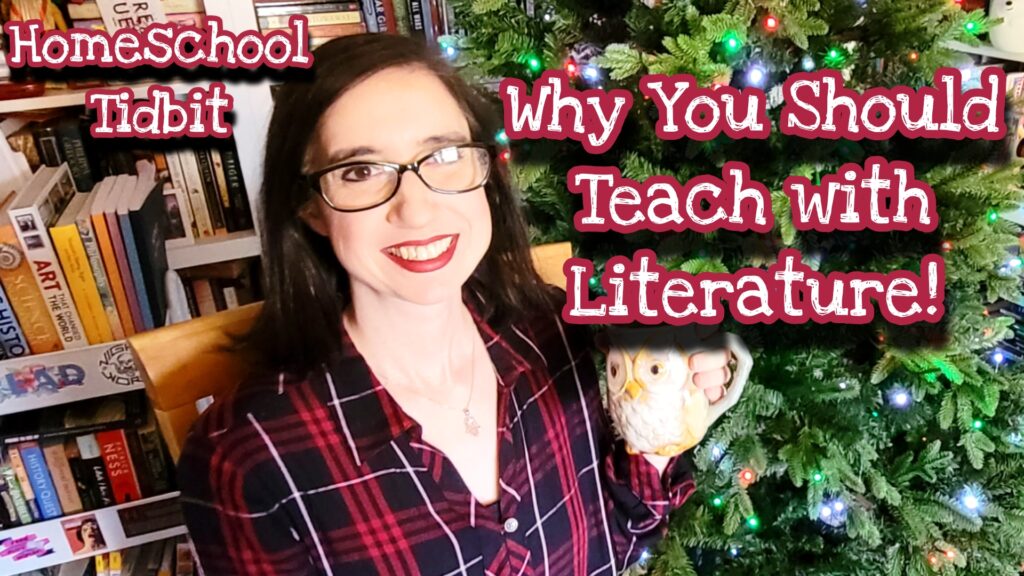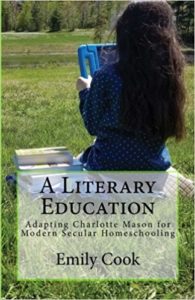Homeschool Tidbits: 5 Reasons to Consider a Literature-Based Curriculum
November 18, 2022

Welcome to Build Your Library’s Homeschool Tidbits: Episode 37 – Five Reasons to Consider a Literature-Based Curriculum. In this weekly video series, I will delve briefly into a topic related to homeschooling and will share some of my knowledge and expertise as a long-time homeschooling mother of 4 children. Three of whom have graduated high school and one who is a college graduate!
I grew up a bookworm. I loved books dearly and spent most of my free time reading. When I began homeschooling my own children, I wanted to find a way to pass that love of reading on to them. In all my early research about homeschooling, I stumbled upon Charlotte Mason and the concept of teaching with living books and literature. I was so excited about the idea of getting to share my favorite books with my kids AND calling it school. What an amazing way to learn!
Choosing a homeschool curriculum is a big hurdle when you first start homeschooling. There are so many different ideas to wade through and so much trial and error as you figure out what works best for your family. Today I want to share some reasons to consider using a literature-based curriculum.
It’s More Engaging
Think back on how you were taught subjects like history and science. You probably read a chapter in a textbook, perhaps listened to a lecture, and took notes. Then you “temporarily” memorized a bunch of facts, just long enough so you could pass the test. How much fun were you having while you learned? How many of those unconnected facts do you actually still remember?
When you use real literature, both fiction, and well-written narrative non-fiction, you will see your children are far more engaged. Perhaps even captivated by their lessons. It’s no longer boring dry facts that you are trying to help them memorize. It’s knowledge gained through stories, fascinating people, and memorable places. Their lessons become exciting and they even start to look forward to them! Because they are so engaged, this learning will create a lasting impression on them long after you’ve moved on to new topics and subjects.
The Lessons Become Relevant
Again, learning about a battle, or a list of names and dates can be boring. But if you use an exciting and engaging story to teach that information, suddenly the information sticks! We learn best through stories.
Let’s take that scenario above. If you are studying the Civil War the traditional way, you are given a list of dates, important battles, and generals to memorize. Then you pass a test and move on to the next thing. But when you learn through literature, you will read descriptive and interesting stories about the people living through the events of the war. Your child will gain an understanding of why the war happened, the motivations of the soldiers and generals, the foods they ate, how they lived, and even the clothing they wore. They may not memorize every battle and date. But the depth of information they did obtain is so much more important in understanding history. And isn’t that what we’re going for here?
Making Connections
You can read living books for so many different subjects, even math! If you learn this way for even just a few years, your child is going to start putting things together that you might not even have thought to teach or explain to them. That’s because they are gaining so much true knowledge from the stories and books they are reading, many times without noticing it at that moment.
Have you ever learned about someone or something and then suddenly you see and hear about them everywhere? Or you are watching a movie and they are referenced? You get excited because it’s building your knowledge bank about that information! These ah-ha moments are going to stick with your child long past the lesson because it was information they discovered on their own. These are the moments when you will feel like you’ve won the homeschool lottery.
My 13-year-old is the queen of making connections. She collects these little tidbits of information to pull out at random times. Recently, I read her The Fall of the House of Usher by Edgar Allan Poe, a story I was sure was going over her head. Just a few weeks later she was telling me about a creepypasta she was reading and mentioned that a character was buried alive – “Just like in that Poe story!” We are currently reading The Book Thief by Markus Zusak and taking some time to learn more about World War II as we go. Upon reading about a family hoping to go to Amsterdam to flee Nazi Germany, she excitedly pointed out, “That’s just like Anne Frank’s family!” Something we read about over a year ago!
Family Learning, Family Bonding
You can even roll all your children together into lessons when you are learning with real literature. Literature-based learning is perfect for family-style instruction! When we imagined what homeschooling might look like, I bet like me, you pictured snuggling together with a good book on the sofa. True, it might not always look like snuggling, but reading great books and having rich discussions with our children can be the best part of our homeschool day. This is where real learning happens! This is quality time with your children that you will fondly look back on someday when they have all grown up and moved away.
When you are all learning together, you will see them develop a wonderful bond over the books you share together. They’ll create inside jokes, play imaginative games act out scenes, and debate over heroes, villains, and favorite books. You are building relationships. Both with each other and with books and knowledge.
Raising a Reader
Finally, and maybe best of all, you are raising readers when you use a literature-based curriculum. You are introducing your children to so many different books, and genres and showing them that non-fiction can be just as fascinating as a good fictional story. You can use a literature-based curriculum to hook a reluctant reader, expose an already avid reader to genres they had never explored, and show kids who think they hate reading that actually there are some pretty great stories out there. If you know where to look.
I can’t guarantee that your children will grow up to own huge libraries or that they will read 100 books a year when they are adults. But I can promise that you will give them all the tools necessary to grow into adults who enjoy the act of reading. And in this fast-paced, screen-savvy society, that is something to get excited about.
Literature-based learning might not work for every family or even every child in a family, but it is worth giving a try. If you have never explored this option before, I recommend trying out a literature-based unit study to test the waters before diving headfirst into a full-year program. This way you can spend a few weeks dabbling to see if it is the right fit for your family.
Coming up next…
I hope you found this Tidbit helpful! Come back next week for more homeschooling inspiration!
Until then, happy reading!
See Other Related Articles:
- Happy, Hygge Homeschooling?
- “Are worms made out of metal?” And other great rabbit trails.
- Charlotte Mason in the Secular Homeschool
- A Literary Education book
- About Build Your Library
- Homeschool Tidbits: Build Your Library’s Weekly Video Blog Series
.
 Emily Cook is the author and creator of the secular homeschool curriculum Build Your Library, a literature-based K-12 program infused with the teachings of Charlotte Mason. She writes full-year lesson plans as well as shorter topical unit studies. Emily has been homeschooling her four children in Southern NH for 21 years. She is passionate about reading aloud to children of all ages and loves to share her love of literature with others. She and her family also make incredibly dorky videos about homeschooling, books, and more on Youtube at ARRRGH! Schooling. You can follow her on Facebook, Twitter, and Pinterest. You can also check out her author page on Amazon.
Emily Cook is the author and creator of the secular homeschool curriculum Build Your Library, a literature-based K-12 program infused with the teachings of Charlotte Mason. She writes full-year lesson plans as well as shorter topical unit studies. Emily has been homeschooling her four children in Southern NH for 21 years. She is passionate about reading aloud to children of all ages and loves to share her love of literature with others. She and her family also make incredibly dorky videos about homeschooling, books, and more on Youtube at ARRRGH! Schooling. You can follow her on Facebook, Twitter, and Pinterest. You can also check out her author page on Amazon.
